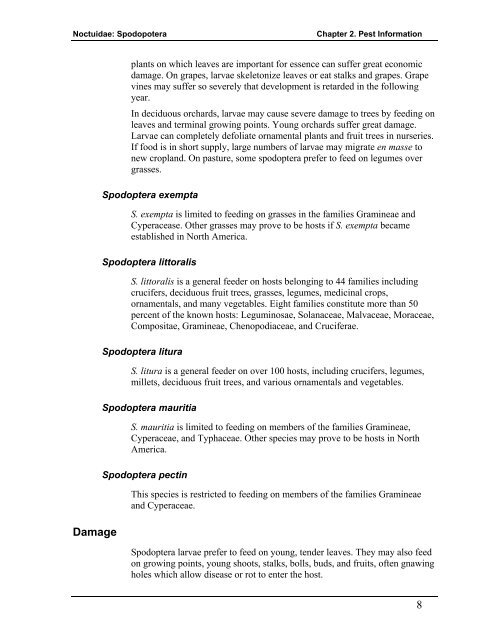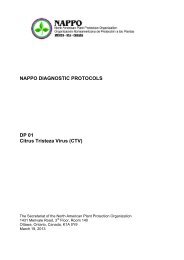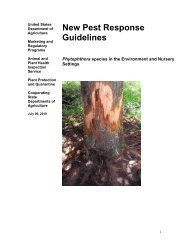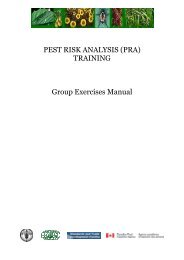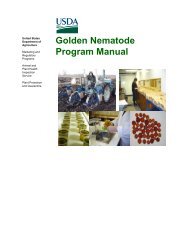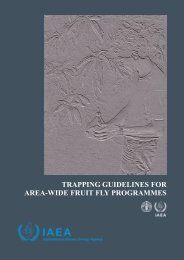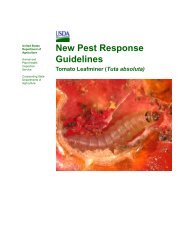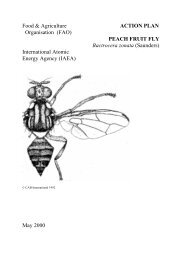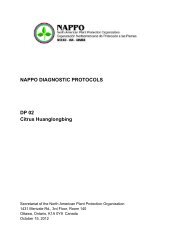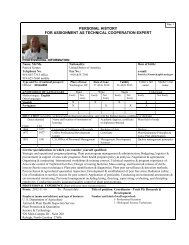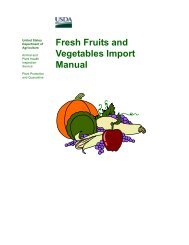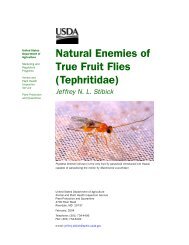New Pest Response Guidelines - Phytosanitary Resources
New Pest Response Guidelines - Phytosanitary Resources
New Pest Response Guidelines - Phytosanitary Resources
Create successful ePaper yourself
Turn your PDF publications into a flip-book with our unique Google optimized e-Paper software.
Noctuidae: Spodopotera<br />
Chapter 2. <strong>Pest</strong> Information<br />
Damage<br />
plants on which leaves are important for essence can suffer great economic<br />
damage. On grapes, larvae skeletonize leaves or eat stalks and grapes. Grape<br />
vines may suffer so severely that development is retarded in the following<br />
year.<br />
In deciduous orchards, larvae may cause severe damage to trees by feeding on<br />
leaves and terminal growing points. Young orchards suffer great damage.<br />
Larvae can completely defoliate ornamental plants and fruit trees in nurseries.<br />
If food is in short supply, large numbers of larvae may migrate en masse to<br />
new cropland. On pasture, some spodoptera prefer to feed on legumes over<br />
grasses.<br />
Spodoptera exempta<br />
S. exempta is limited to feeding on grasses in the families Gramineae and<br />
Cyperacease. Other grasses may prove to be hosts if S. exempta became<br />
established in North America.<br />
Spodoptera littoralis<br />
S. littoralis is a general feeder on hosts belonging to 44 families including<br />
crucifers, deciduous fruit trees, grasses, legumes, medicinal crops,<br />
ornamentals, and many vegetables. Eight families constitute more than 50<br />
percent of the known hosts: Leguminosae, Solanaceae, Malvaceae, Moraceae,<br />
Compositae, Gramineae, Chenopodiaceae, and Cruciferae.<br />
Spodoptera litura<br />
S. litura is a general feeder on over 100 hosts, including crucifers, legumes,<br />
millets, deciduous fruit trees, and various ornamentals and vegetables.<br />
Spodoptera mauritia<br />
S. mauritia is limited to feeding on members of the families Gramineae,<br />
Cyperaceae, and Typhaceae. Other species may prove to be hosts in North<br />
America.<br />
Spodoptera pectin<br />
This species is restricted to feeding on members of the families Gramineae<br />
and Cyperaceae.<br />
Spodoptera larvae prefer to feed on young, tender leaves. They may also feed<br />
on growing points, young shoots, stalks, bolls, buds, and fruits, often gnawing<br />
holes which allow disease or rot to enter the host.<br />
8


